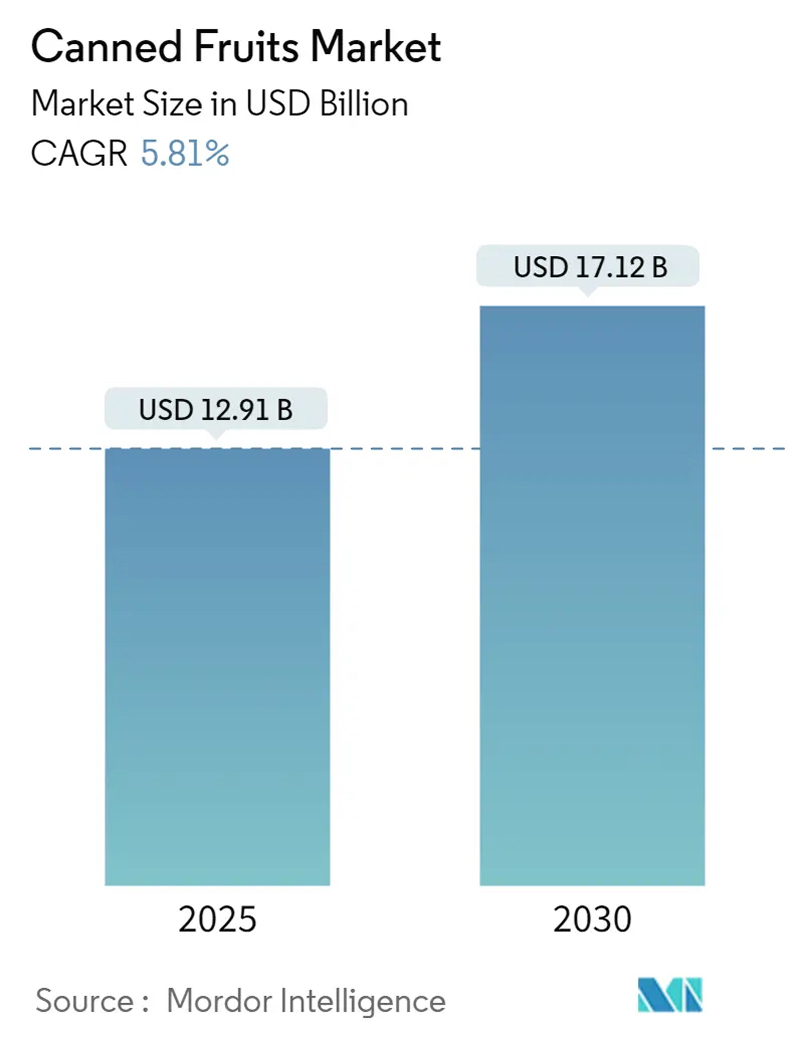 time:2025-06-12
time:2025-06-12
 views:34
views:34
Canned Fruit Market Size

Canned Fruit Market Analysis
The Canned Fruits Market size is estimated at USD 12.91 billion in 2025, and is expected to reach USD 17.12 billion by 2030, at a CAGR of 5.81% during the forecast period (2025-2030).
The canned fruit industry is witnessing significant transformation driven by evolving consumer preferences and sustainability initiatives. Manufacturers are increasingly focusing on clean-label products, with many canned fruit manufacturers eliminating artificial preservatives and adopting transparent ingredient listings. This shift is particularly evident in premium product launches, where companies are emphasizing natural ingredients and minimal processing. For instance, in July 2023, Del Monte Foods launched a new range of canned fruits products including Tropical Gold Pineapple and Tropical Fruit Mix, specifically targeting the premium segment with natural, preservative-free offerings. According to recent industry data, about 87% of major manufacturers' packaging is now recyclable, reusable, or compostable, reflecting the industry's commitment to sustainability.
The distribution landscape for canned fruits is experiencing notable evolution, particularly in the modern retail sector. Supermarkets and hypermarkets are implementing innovative merchandising strategies, including store-within-store concepts and dedicated healthy food sections featuring canned fruits. In August 2023, Tiger Brands expanded its presence in the local general trade by implementing robust route-to-market solutions, reaching more than 46,500 general trade outlets with a target of 50,000 by year-end. This expansion demonstrates the industry's focus on improving accessibility and visibility of canned fruit products across various retail channels.
Technological advancements in canning processes and packaging innovations are reshaping the industry landscape. Manufacturers are investing in state-of-the-art processing facilities and adopting new packaging technologies to enhance product quality and shelf life. In March 2023, Tiger Brands launched a new multi-purpose innovation center in Johannesburg, representing a significant portion of their R42 million investment in enhancing research and development facilities. The industry is particularly focused on developing BPA-free packaging solutions, with major players like Edward & Sons Trading Company conducting independent tests through licensed third-party laboratories to validate their BPA-free claims.
Consumer preferences are increasingly gravitating toward healthier options within the processed fruits market, particularly products with reduced sugar content and natural fruit juice bases. According to the International Food Information Council's 2023 report, approximately 40% of consumers consider "fresh" as the primary definition of healthy food, prompting manufacturers to adapt their canning processes to maintain the natural characteristics of fruits. This trend has led to the development of innovative product lines featuring fruits canned in their own juices rather than traditional syrup bases, and the introduction of organic variants that cater to health-conscious consumers seeking cleaner ingredient profiles.
Canned Fruit Market Trends
Growing Consumer Preference for Convenience Food
The burgeoning preference for convenient and healthy food choices has become a significant factor supporting the growth of the market studied. This shift in consumer behavior is gaining prominence in reshaping the industry, with canned fruits gaining prominence as a health-conscious option. According to the Centers for Disease Control and Prevention, only 10% of adults consume enough fruits or vegetables due to factors like high cost, limited availability and access, or perceived lack of preparation time. Canned fruits address these barriers by offering an affordable, nutritious, great-tasting, and highly convenient alternative. The demand for convenience products is growing at a faster pace due to changes in consumption patterns, as well as increased awareness about concepts like portion control.
As the working population has significantly hectic schedules, they prefer convenience and on-the-go food products to save time and relieve hunger pangs. According to the Bureau of Labor Statistics, in 2022, the employment level in the United States increased over the previous year to 158.29 million people. Busy lifestyles and time constraints have led consumers to seek convenient meal options. The rise in on-the-go consumption patterns, driven by busy schedules and a mobile lifestyle, positions canned fruits as a portable and easily accessible snack or meal component. Several research studies have indicated that canned fruits are nutritionally similar to fresh and frozen and, in some cases, even better. For example, canned tomatoes have more lycopene, which is associated with reducing cancer risk, and contain higher amounts of Vitamin B than fresh tomatoes.
Source: https://www.mordorintelligence.com/industry-reports/canned-fruits-market